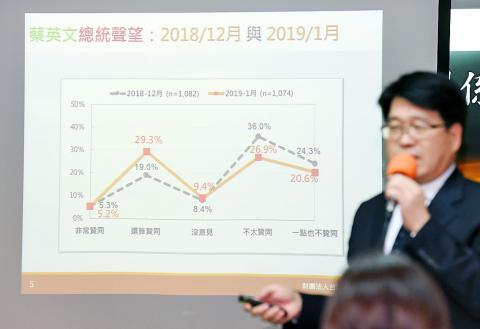President Tsai Ing-wen’s (蔡英文) approval rating increased by more than 10 percentage points in the wake of Chinese President Xi Jinping’s (習近平) Jan. 2 speech about Taiwan, a Taiwanese Public Opinion Foundation poll released yesterday found.
Tsai’s approval rating rebounded from a record low of 24.3 percent to 34.5 percent, her highest since June last year, because of her defiant response to Xi’s speech, foundation chairman Michael You (游盈隆) told a Taipei news conference.
Her disapproval rating also declined by 12.8 percentage points to 47.5 percent from a record high of 60.3 percent, You said.

Photo: Liao Chen-huei, Taipei Times
“This was a dramatic change and the Chinese factor was the only reason. Xi did Tsai a great favor, although it was unintended,” he said.
Asked whether they were happy with Tsai’s cross-strait policies, 43.2 percent of respondents said they were, while 49 percent said they were not, the poll found.
Compared with a month before, those who approved of Tsai’s cross-strait policies increased by 18 percentage points, while those who disapproved of them fell by 17 percentage points.
The jump in Tsai’s approval rating coincided with a marked increase in the number of respondents supporting Taiwan independence, You said.
Asked whether Taiwan should become independent or unify with China in the future, 47. 5 percent of respondents said they support independence, 22.7 percent said they support unification and 18.5 percent preferred the “status quo,” the poll showed.
It was the most support for independence since September 2017, the foundation said.
Support for independence increased by 12.4 percentage points from last month’s poll, while supporters of unification and the “status quo” fell by 1.1 and 10.7 percentage points respectively.
“The figures suggest more people who previously supported maintaining the ‘status quo’ now support independence because of Xi’s speech, while the number of people supporting unification remain about the same,” You said.
Questions related to Xi’s speech yielded similar results, with the majority of respondents supporting independence and one-quarter supporting unification, he said.
Asked if they agreed with Xi that “the mainland and Taiwan belong to one China,” 24 percent said they agreed, while 68.3 percent disagreed, the poll found.
Asked if they support peaceful unification and China’s “one country, two systems” framework, 24.6 percent said yes, compared with 67.1 percent who opposed it.
In addition, 19.2 percent of respondents said Taiwan needs to rely on the so-called “1992 consensus” for survival, while 67.5 percent disagreed.
Former premier William Lai (賴清德) received a high approval rating of 53.2 percent, an increase of 5.8 percentage points over a similar poll in September last year, You said.
Asked whether they have confidence in the new Cabinet led by Premier Su Tseng-chang (蘇貞昌), 38.7 percent of respondents said they did, while 52 percent said they did not, the poll found.
The poll, conducted on Monday and Tuesday last week, collected 1,074 valid samples.

The first global hotel Keys Selection by the Michelin Guide includes four hotels in Taiwan, Michelin announced yesterday. All four received the “Michelin One Key,” indicating guests are to experience a “very special stay” at any of the locations as the establishments are “a true gem with personality. Service always goes the extra mile, and the hotel provides much more than others in its price range.” Of the four hotels, three are located in Taipei and one in Taichung. In Taipei, the One Key accolades were awarded to the Capella Taipei, Kimpton Da An Taipei and Mandarin Oriental Taipei. Capella Taipei was described by

EVA Airways today confirmed the death of a flight attendant on Saturday upon their return to Taiwan and said an internal investigation has been launched, as criticism mounted over a social media post accusing the airline of failing to offer sufficient employee protections. According to the post, the flight attendant complained of feeling sick on board a flight, but was unable to take sick leave or access medical care. The crew member allegedly did not receive assistance from the chief purser, who failed to heed their requests for medical attention or call an ambulance once the flight landed, the post said. As sick

Minister of Economic Affairs Kung Ming-hsin (龔明鑫) yesterday said that private-sector refiners are willing to stop buying Russian naphtha should the EU ask them to, after a group of non-governmental organizations, including the Centre for Research on Energy and Clean Air (CREA), criticized the nation’s continued business with the country. While Taiwan joined the US and its Western allies in putting broad sanctions on Russia after it invaded Ukraine in 2022, it did not explicitly ban imports of naphtha, a major hard-currency earner for Russia. While state-owned firms stopped importing Russian oil in 2023, there is no restriction on private companies to

INDUSTRY: Beijing’s latest export measures go beyond targeting the US and would likely affect any country that uses Chinese rare earths or related tech, an academic said Taiwanese industries could face significant disruption from China’s newly tightened export controls on rare earth elements, as much of Taiwan’s supply indirectly depends on Chinese materials processed in Japan, a local expert said yesterday. Kristy Hsu (徐遵慈), director of the Taiwan ASEAN Studies Center at the Chung-Hua Institution for Economic Research, said that China’s latest export measures go far beyond targeting the US and would likely affect any country that uses Chinese rare earths or related technologies. With Japan and Southeast Asian countries among those expected to be hit, Taiwan could feel the impact through its reliance on Japanese-made semi-finished products and